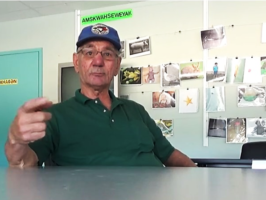Looking back on 2018, I see my most interesting time as the two weeks in July that I spent working in New Brunswick, Canada, with Victor Atwin, pictured here. He is a Maliseet elder from the Kingsclear First Nation—an expert speaker of the Maliseet language and a teacher in the language revival program at St. Mary’s First Nation in Fredericton. We transcribed and translated a substantial body of material in Maliseet that was tape-recorded in the 1970s by the anthropologist László Szabó of the University of New Brunswick. Victor is an accomplished story-teller himself, and as a young man he knew many of the speakers whom Szabó recorded—and heard many of their tales. The texts that we worked on this past summer include not only a variety of family stories, but also accounts of historical events that had been transmitted orally over many years. One particularly moving narrative tells the story of an attack on the village at Kingsclear by a group of white men who were working as log drivers on the Saint John River in the mid-nineteenth century. The drivers, numbering nearly 100, set upon the Native village, breaking down the doors of people’s homes with the intent of killing the men and raping the women. A Native counterattack, led by an older Maliseet woman, killed many of the loggers and drove the others away. A contemporaneous account of these events appeared in a local newspaper. The date was 1866.
Daily Archives: January 2, 2019
A Recent Project
I have been working for the last several weeks (during December, 2018) on an article that presents new editions of four poems in Passamaquoddy, an Eastern Algonquian language of Maine, that were published in the nineteenth and early twentieth centuries by Charles Godfrey Leland (1824–1903) and John Dyneley Prince (1868–1945), two of the leading figures in their era involved in documenting the traditions of the Native peoples of New England and Maritime Canada. The original texts appeared in Leland’s Algonquin Legends of New England (1884) and Prince’s Passamaquoddy Texts (1921) and several of the latter scholar’s articles. The transcriptions these early linguists employed were quite inaccurate, making it challenging to work out the Passamaquoddy lines of the poems that they had heard. Nonetheless, it appears to be possible to pin down the texts in their entirety. I will be submitting my article that explains the process I have used in recovering them to the journal Anthropological Linguistics in January. A link to this piece will be appearing soon in the Publications section of this page.
Welcome to my webpage!
This page has three main purposes:
- First, it is intended to make information about my classes in Anthropology and Second Language Studies at Indiana University, Bloomington, available to current and prospective students.
- Second, it will make my research on Native American languages more readily available to Native scholars and to the general public.
- Third, it will give me a way to keep friends and colleagues informed about my interests and activities.
I will add blog posts from time to time to let you all know about my travels, my work, and other things that I am up to that might interest some of you. I hope that this page may prove useful, and that it may sometimes bring amusement!
